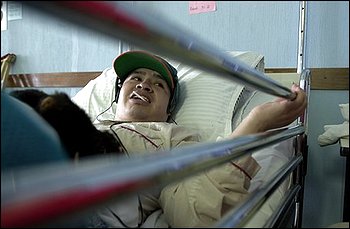
Today, in the South Florida town of Stuart, a jury found that a hospital which chartered a plane and sent a brain injured illegal immigrant back to his home country of Guatemala, over objections of his family and legal guardian, acted reasonably.
This case is a prime example of the dilemma facing many hospitals in the U.S.: what to do with patients who are unable to pay for necessary long-term care, and, because of their immigration status, do not qualify for state or federal aid.
The lawsuit was filed against Martin Memorial Medical Center by Montejo Gaspar, the cousin and legal guardian of 37-year-old Luis Jimenez. In 2000, Jimenez was riding in a van that was struck by a drunk driver – leaving him a paraplegic with the cognitive ability of a fourth grader. Gaspar sought nearly $1 million to cover the estimated cost of his cousin’s care in Guatemala, plus damages from the hospital for “unlawfully detaining” him and punitive damages to discourage other medical centers from acting similarly.
The hospital said it was simply following a court order, which was being appealed by Gaspar at the time, and that Jimenez wanted to go home. The 6-member jury unanimously found in favor of the hospital.
Under federal law, all hospitals that receive Medicare reimbursements are required to provide emergency care to all patients and provide a discharge plan once the patient has stabilized. But, because he was an illegal immigrant and did not have insurance, no other hospital would provide long-term care to Jimenez.
Jimenez spent nearly three years under the care of Martin Memorial before the hospital, supported by a letter from the Guatemalan government, got a Florida judge to approve his transfer to a hospital in that country. Gaspar appealed this decision. However, without telling Jimenez’s family, Martin Memorial chartered a $30,000 flight and sent Jimenez home on July 10, 2003 – the day after Gaspar filed an emergency request to stop the hospital’s plan.
Gaspar eventually won his appeal when the court ruled that a state judge does not have the power to decide immigration cases, and Jimenez should not have been sent back to Guatemala. By the time this ruling had come through, Jimenez had already been released from the Guatemalan hospital he was transferred to and was living with his 73-year-old mother.
Though the most recent ruling did not fall in their favor, Gaspar’s attorney Bill King believes some good came from winning the initial appeal and the hearing of the most recent case. ”We’ve shown that state judges cannot authorize what is tantamount to private deportation of undocumented immigrants and that hospitals have to follow the federal requirements that are in place for the discharge of all people, including undocumented immigrants,” he said.

GOOD !